Iranian FM Claims EU Will Not Implement Anti-IRGC Resolution
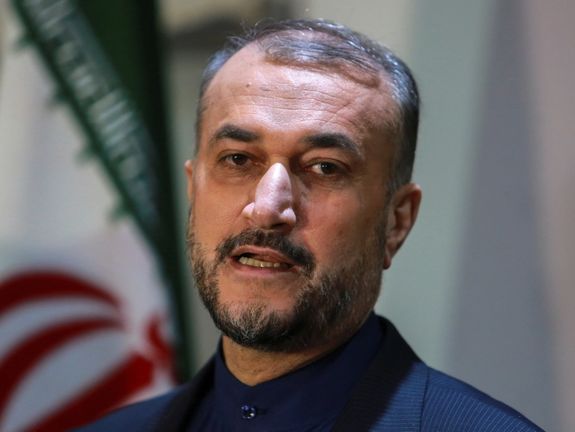
Iran’s foreign minister says EU officials including Josep Borrell have stated they are not looking to implement a proposed resolution against the Revolutionary Guard.

Iran’s foreign minister says EU officials including Josep Borrell have stated they are not looking to implement a proposed resolution against the Revolutionary Guard.
In an interview with ICANA new agency about the recent resolution adopted by the European Parliament to designate the IRGC as a terrorist organization, Hossein Amir-Abdollahian said “the European Parliament has made an emotional decision and rationality did not rule their meeting”.
“We have been trying to get the European Union to change its direction for months, and …they concluded that this issue should not be raised in the European Union as the decisions of the council of ministers are binding. However, they passed the resolution in the European Parliament as a show,” he added.
The Iranian foreign minister claimed that according to conversations with Joseph Burrell and the rotating president of the European Union, they are not seeking to implement the resolution and that the resolution is only an expression of the feelings of some European Parliament members.
Regarding the possibility of Iran's withdrawal from the NPT by expelling IAEA inspectors he threatened that “a small number of European political leaders have no experience in diplomacy, including the German foreign minister, so if they do not correct their positions, anything is conceivable.”
Iranians launched a movement to ask European politicians to designate the IRGC as a terror group, as it was responsible for leading most of the security forces who killed, maimed and arrested protesters.
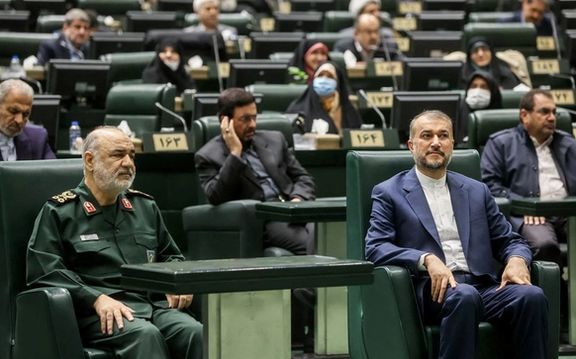
The Islamic Republic of Iran upped the ante in its threats to Europe over the proposed listing of IRGC as a terrorist organization, being considered by the EU.
The parliament in Tehran held a special meeting Sunday with foreign minister Hossein Amir-Abdollahian and IRGC commander Hossein Salami attending.
After the meeting, parliament speaker Mohammad Bagher Ghalibaf (Qalibaf) issued a statement saying, “We will have actions on the agenda against European armed forces in the region.”
This clear threat comes as Iran and its proxy forces in Iraq and Syria have been targeting US military forces with missiles, rockets and mortars since 2019. These attacks were the immediate reason why in January 2020 former President Donald Trump ordered the killing of Qassem Soleimani, IRGC’s commander for extra-territorial operations.
Ghalibaf also declared that “This parliament is ready to designate European armed forces n the region as terrorist.” He added that if the IRGC is designated, “Europe will pay a full price for that.”
The issue of Europe listing the IRGC emerged in recent weeks as the Iranian regime has killed more than 500 people during popular protests that started in September, after the death of Mahsa Amini in hijab police custody.
Iranians launched a movement to ask European politicians to designate the IRGC as a terror group, as it was responsible for leading most of the security forces who killed, maimed and arrested protesters. The campaign was to an extent successful, bringing together European lawmakers from various groups and parties.
Last week, the European Parliament passed a resolution urging the Council of Europe to declare the Revolutionary Guard a terrorist organization.
It is by no means certain that the Europe will take this step, but some countries such as the United Kingdom might act.
The threats coming from the Iranian regime do have a deterrent purpose, but Iranian officials know there is little chance for the European Union to designate the Revolutionary Guard. If the EU simply announces partial sanctions on the IRGC, the regime can then claim victory that its threats worked.
One member of parliament Sunday made the highly questionable threat that the Islamic Republic can “limit navigation for European vessels” in the Persian Gulf’s Hormuz Strait. However, Iran has attacked foreign shipping in the region, using mines and drones, and has also boarded and impounded some tankers.
The political-ideological commissar of the IRGC also threatened energy shipments form the Persian Gulf, a threat Tehran officials including former presidents have made on some occasions.
Foreign minister Amir-Abdollahian tweeted after the parliamentary session that the Europe by passing the parliament resolution against the IRGC “shot itself in the foot.” He also did not rule out leaving the Nuclear Non-Proliferation Treaty (NPT) when asked by a reporter to say what Iran would do if the EU goes ahead with listing the IRGC.
In addition to the violent and deadly suppression of the protests, Tehran has been supplying kamikaze drones to Russia used in attacks on Ukrainian civilian targets. Many European politicians see this as an attack on Europe and together with United States have demanded Iran stop sending weapons to Russia.
With the serious deterioration in ties, it seems much less likely that the West would reopen nuclear talks with Tehran which were suspended last September after the US rejected what it said were extraneous demands by Tehran.
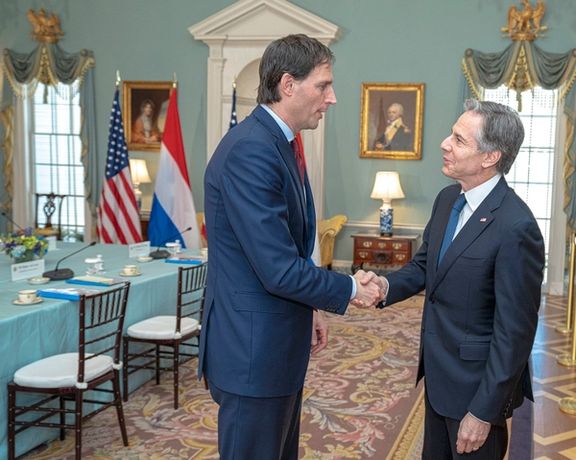
As the European Council is set to decide about European Parliament’s call to list Iran’s Revolutionary Guard as a terror group, the Netherlands has already expressed its support.
Dutch Foreign Minister Wopke Hoekstra said in a tweet on Thursday that “The Netherlands is strongly in favour of listing the IRGC as an entity, a step that requires the joint commitment of EU member states.”
He added that he held talks with High Representative of the EU for Foreign Affairs and Security Policy Josep Borrell about Russia and Iran.
“We also addressed the grave human rights violations in Iran,” he said, noting that “We need to continue to sanction those responsible.”
Hoekstra also said he will also hold talks with German Foreign Minister Annalena Baerbock to address this issue at the upcoming EU Foreign Affairs Council.
The Dutch foreign minister also held talks with US Special Envoy for Iran Robert Malley. “Productive meeting with Foreign Minister Hoekstra. We discussed our common steps to confront Iran's human rights abuses and counter its provision of weapons to Russia for use in its brutal war of aggression against Ukraine,” Malley said.
Although the European Parliament overwhelmingly passed the non-binding resolution on January 19, it cannot decide to designate the IRGC, which is an issue within the purview of the EU Council, comprised of ministers of each EU country. If the resolution garners enough support, it is then upon the national governments of the EU member states to make the final decision. The listing of the IRGC must have a unanimous vote by all 27 EU members in the EU Council.
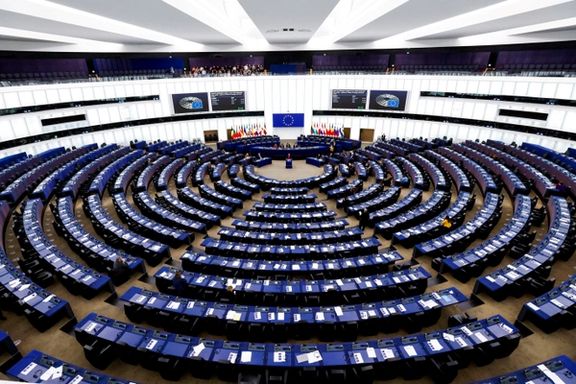
While many Iranians welcomed the European Parliament’s resolution that calls on EU to list the Revolutionary Guard as a terrorist group, regime officials have threatened to respond.
After the European Parliament overwhelmingly passed the resolution Thursday that may eventually lead to the designation of the IRGC, people on social media started to congratulate each other, describing it as yet another victory for their revolt against the clerical regime.
Since the beginning of the current wave of antigovernment protests ignited by a Iranian young woman – Mahsa Amini – the Iran’s government is becoming more isolated in the international community. So far, the Islamic Republic was voted out from the United Nations Commission on the Status of Women (CSW) for policies contrary to the rights of women and girls in December. Another step was by the Geneva-based UN Human Rights Council’s decision on November 24 to launch an independent investigation into the regime’s deadly repression of protests that has killed around 500 civilians, including about 60 children. Several rounds of sanctions by the European Union, the US, Canada and others also targeted officials and entities involved in the crackdown.
According to social media videos, people in some Kurdish cities, including Saqqez – the hometown of Amini -- and Mahabad, came to the streets and rejoiced with fireworks following the approval of the resolution.
Videos sent to Iran International from different cities such as Qom – home to Iran’s biggest seminary -- and the southern city of Bandar Abbas show people distributing candies to celebrate the decision. In one video, someone said that they are watching the European Parliament’s session live on Iran International TV, adding that it is more exciting than the World Cup matches.
Meanwhile, Islamic Republic’s officials, who had started threatening Europe even before the vote, have intensified their rhetoric against European countries over the decision.
Foreign Ministry spokesman Nasser Kanaani said the reason for the designation of IRGC as a terrorist organization is that Europe is infuriated over the IRGC’s leading role in the fight against terrorism. “The reason behind the anger of the ‘global club of terrorists’ is crystal clear. The IRGC is the world’s largest counter-terrorism institution,” he wrote in a tweet on Friday.”
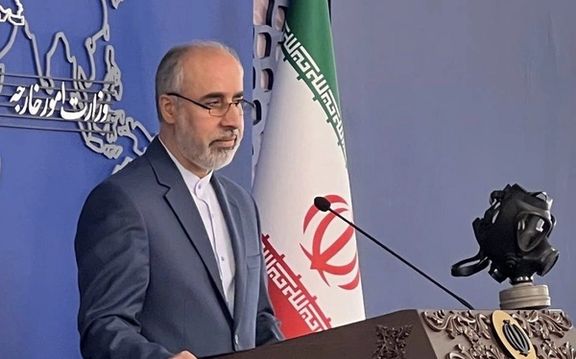
In a statement on Friday, the Army condemned the move, claiming that it exposed the enemies’ grudge against the Islamic establishment in Iran. “The measure of the European Parliament, which claims to be fighting terrorism, against an anti-terrorist institution is out of their desperation and failure in supporting recent riots in Iran,” read the statement.
Hardliner Iranian lawmaker Mohammad Esmail Kowsari, himself a former IRGC commander, said on Friday, "One should ask where the IRGC has committed terrorist acts. They conspired to overthrow the Islamic Republic and the IRGC foiled it." Vowing that the parliament will announce its retaliatory measures on Sunday, he asked, “What part of the IRGC is a terrorist group?”
Criticizing the motion, Speaker of Iran’s parliament, Mohammad Bagher Ghalibaf, said that “If the European Union makes such a decision and lists the Guards as a terrorist organization, it means that the European Union acts as a supporter of terrorism, because the IRGC is the biggest and most successful anti-terrorist entity.”
The whole argument of the Islamic Republic in defense of the IRGC – which has armed proxies in many countries across the region – is its limited role in the battle against the ISIS. But in fact, IRGC was building its own Shiite militant proxy network and to an extent fought against the Sunni extremist group.
The European Parliament cannot decide to designate the IRGC because the terrorists list is not a list decided by the Parliament itself but by the EU Council, comprised of ministers of each EU country. If the resolution garners enough support, it is then upon the national governments of the EU member states to make the final decision. The listing of the IRGC must have a unanimous vote by all 27 EU members in the EU Council.
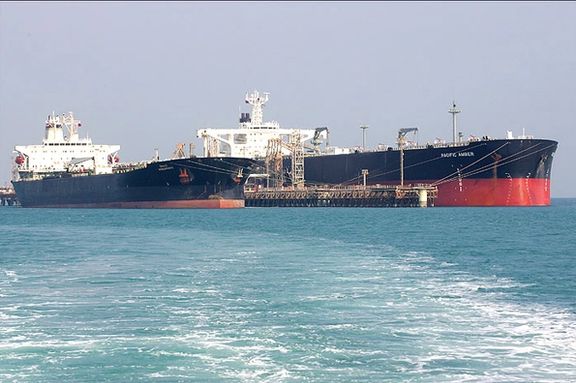
Panama’s shipping registry says it has withdrawn its flag from 136 vessels linked to Islamic Republic in the last four years, denying claims it is knowingly helping Iran violate sanctions.
"The Panamanian registry canceled 136 ships in which their direct link with the National Iranian Oil Company (NIOC) was proven," Panama's Maritime Authority (AMP), said in a statement late on Tuesday. According to the US Treasury, the NIOC has strong links with Iran’s Islamic Revolutionary Guard Corps, which is coordinating the country’s sanctions evasion campaign.
An AMP spokesperson said that one-fifth of the 678 ships for which the registry withdrew flags for various reasons since 2019 were Iran-linked, adding "Panamanian authorities maintain a close relationship with the US secretary of the Treasury and other authorities of the United States.
Providing its flag to some 8,650 ships, the AMP runs the world’s largest vessel registry with 16 percent of the global fleet. It denied failing to act on evidence that tankers operating under its flag had shipped Iranian crude oil in contravention of US sanctions, reacting to allegations by United Against Nuclear Iran (UANI), which seeks to prevent the Islamic Republic from becoming a nuclear-armed regional superpower.
On Monday, former Florida Governor Jeb Bush, who is a member of UANI, called on Washington to pressure Panama to stop "helping" Tehran to evade sanctions.
Shipments of Iranian crude were much higher in 2022 than in 2019 and 2020, when US sanctions had a greater impact. Iran boosted illicit shipments to China from late 2020 as Joe Biden got elected US president and pledged to return to the 2015 nuclear deal, the JCPOA.
Earlier in the month, Iranian navy commander Rear Admiral Shahram Irani said Tehran is planning to extend its area of operation to the Panama Canal that divides South and North America.

The German foreign ministry confirmed Friday that a plan to sanction more members of Iran’s Revolutionary Guard will be on the agenda at EU foreign ministers meeting on Monday.
Two sources told Reuters Thursday that the European Union will add 37 individual entries to its sanctions against Iran on Monday as the bloc is working on listing Tehran's Revolutionary Guards (IRGC) as a terrorist organization.
"We will adopt the fourth package of sanctions against Iran on Monday, and we believe we should already start working on the fifth one to list IRGC as a terrorist organization," said one of the sources, an EU diplomat.
Both sources said 37 new names would be blacklisted for human rights violations when the bloc's foreign ministers meet on Monday. The sanctions would mean the IRGC members would not be allowed to travel to the EU and any assets they hold in Europe would be frozen.
The EU diplomat added, however, that the IRGC would not be sanctioned as an organization - yet.
"If you do this, it has to be legally sound and that is being discussed right now. But it won't be ready for Monday."
The European Parliament Thursday overwhelmingly approved a resolution asking the EU to list the IRGC as a terrorist group.
The EU's chief executive, European Commission President Ursula von der Leyen, earlier this week backed the listing of the IRGC as a terrorist organization in response to what she said was the trampling of fundamental human rights in the Islamic republic.